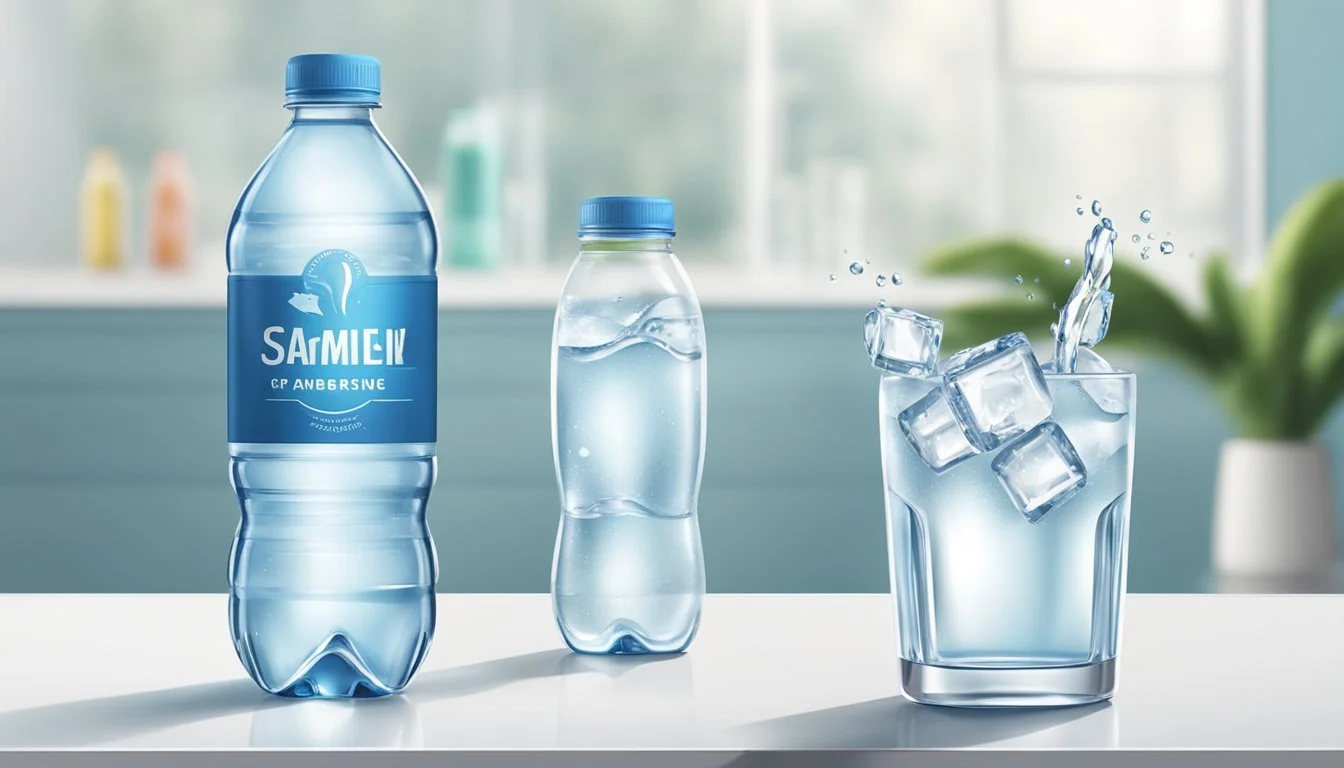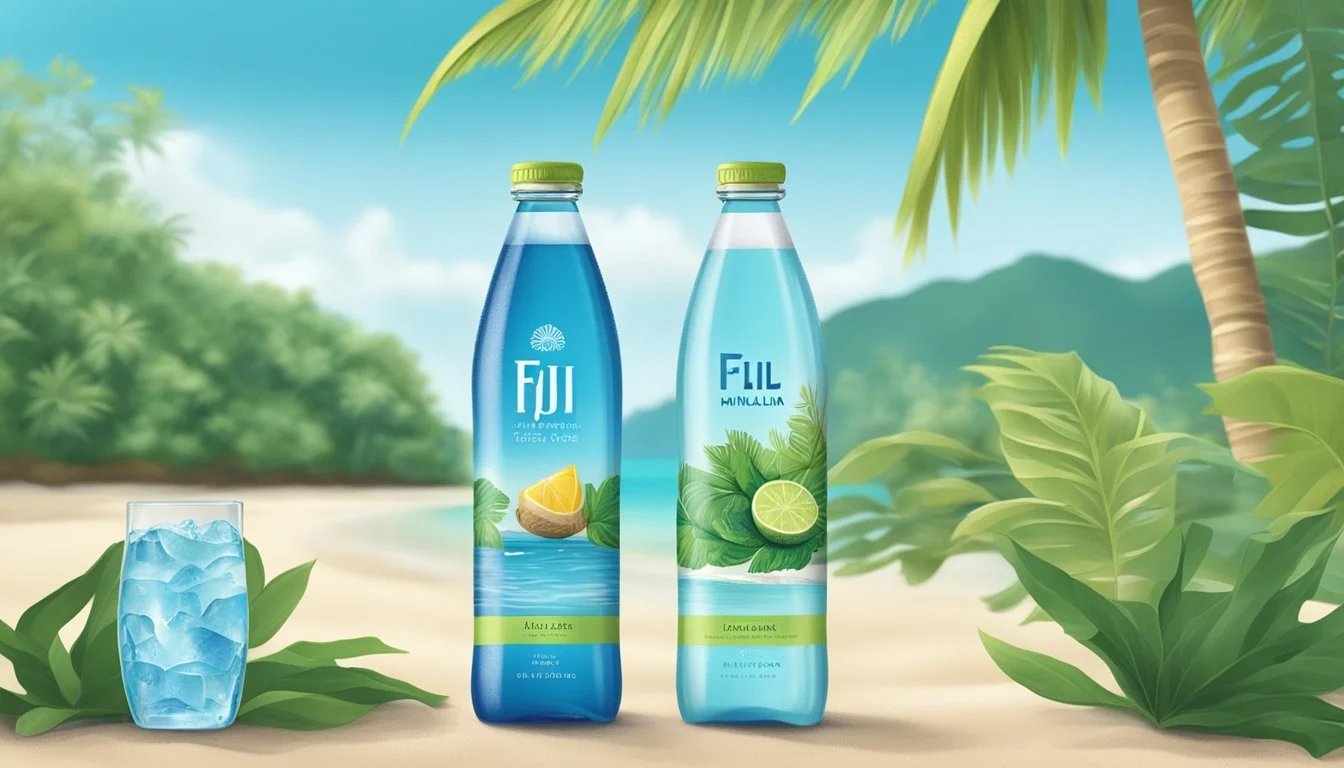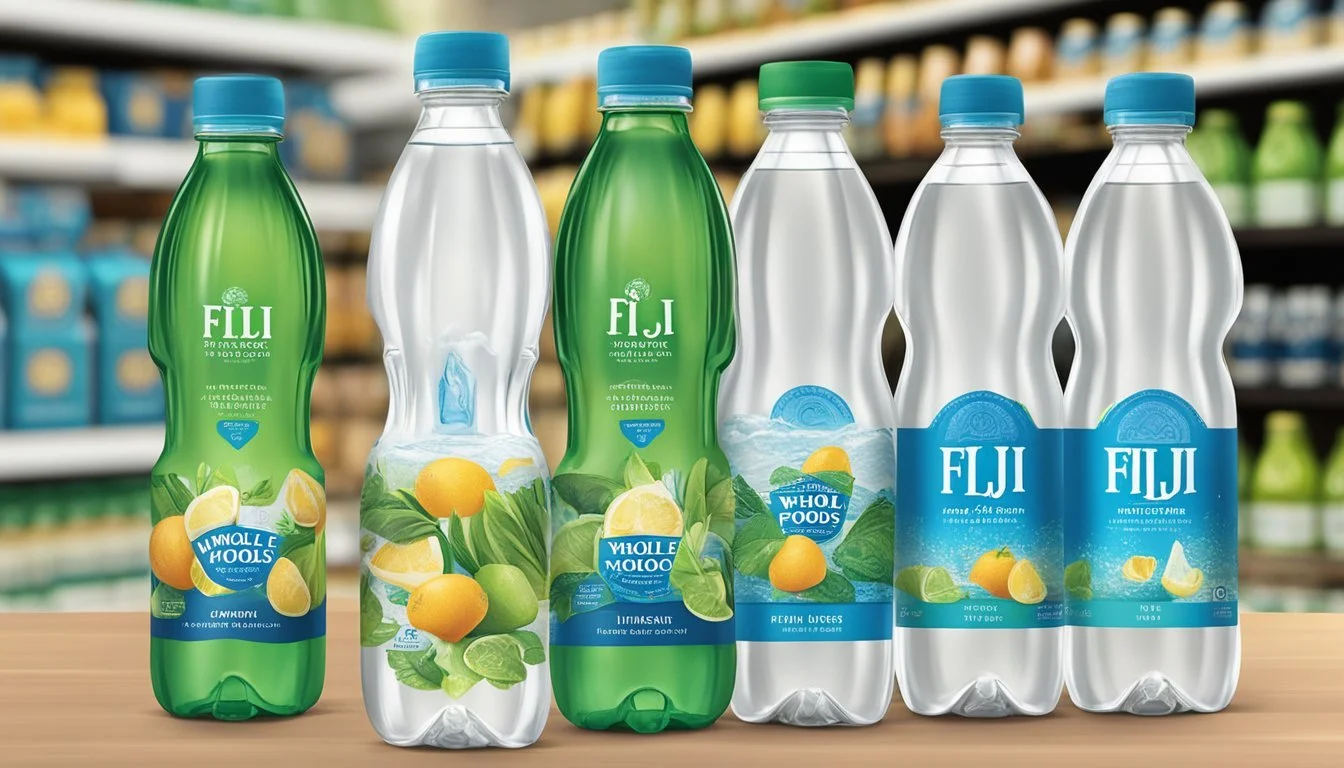Fiji vs. Whole Foods Italian Still Mineral Water
A Comparative Evaluation
When choosing between Fiji Water and Whole Foods Italian Still Mineral Water, consumers are often curious about purity, taste, and health benefits. Fiji Water, known for its high mineral content due to its volcanic rock filtration, often appeals to those seeking natural mineral benefits and a unique taste. On the other hand, Whole Foods Italian Still Mineral Water prides itself on a balanced mineral content and a refreshing, smooth taste, reflecting its pristine Italian sources.
Fiji Water enthusiasts highlight its slightly alkaline pH and the subtle, crisp taste, which they credit to its natural filtration process. Whole Foods Italian Still Mineral Water, sourced from reputed Italian springs, offers a taste profile that many find neutral yet invigorating, making it a versatile option for various occasions.
Understanding the subtle differences and unique qualities of these two premium water brands can help consumers make an informed choice based on their personal preferences and health considerations. By comparing aspects such as mineral content, taste, and sourcing methods, this blog post aims to provide a clear and comprehensive guide to these popular bottled water brands.
Comparing Fiji and Whole Foods Italian Still Mineral Water
Fiji and Whole Foods Italian Still Mineral Water are popular choices among premium bottled water enthusiasts. They differ in origin, mineral content, and taste profile which can influence consumers' preferences.
Brand Origins and Water Sources
Fiji Water is sourced from an artesian aquifer in Fiji, deep below the Earth’s surface. The remote location ensures natural protection from contaminants. This exotic source contributes to its unique branding and appeal.
Whole Foods Italian Still Mineral Water comes from natural springs in Italy. These springs are located in protected regions, known for their rich geological formations. The mineral-rich environment provides a distinct profile to this water.
Label Transparency and Mineral Content
Fiji Water offers detailed information on its label, listing silica, calcium, magnesium, and bicarbonates. This transparency appeals to health-conscious consumers who want to know the specific minerals present in their water.
Whole Foods Italian Still Mineral Water also provides clear labeling. It highlights natural minerals like calcium, sodium, and bicarbonate. The precise breakdown on the bottle helps consumers make informed choices based on their dietary needs.
Taste Profile and Water Characteristics
Fiji Water is celebrated for its smooth, soft mouthfeel. The high silica content contributes to this texture, making it easy to drink and refreshing. It has a clean taste with no aftertaste, adding to its popularity.
Whole Foods Italian Still Mineral Water has a crisp, slightly mineral taste. The natural mineral presence, particularly calcium and bicarbonate, gives it a refreshing quality. It’s known for being revitalizing and thirst-quenching, with a balanced flavor that is neither too strong nor too mild.
These distinctions in origin, mineral content, and taste make both Fiji and Whole Foods Italian Still Mineral Water unique in their own right.
Health and Wellness Implications
Fiji Water and Whole Foods Italian Still Mineral Water offer an array of health benefits due to their mineral content. Understanding the hydration and mineral supplementation they provide is crucial for making an informed choice.
Hydration and Mineral Supplementation
Maintaining optimal hydration is essential for physical and mental performance. Fiji Water is known for its rich mineral content, including magnesium, calcium, potassium, and silica. Magnesium aids in nerve function and muscle contraction. Calcium supports bone health, while potassium helps maintain electrolyte balance.
Whole Foods Italian Still Mineral Water also provides essential minerals but with different concentrations. It offers beneficial amounts of calcium and magnesium, which are vital for cardiovascular health and digestion. Both waters serve as natural sources of mineral supplements, contributing to overall health and well-being.
Comparing Health Benefits
Fiji Water includes 14.7 mg of magnesium, 17.9 mg of calcium, and 4.9 mg of potassium per liter. The beneficial traces of silica can enhance bone strength and skin health.
Whole Foods Italian Still Mineral Water is noted for its higher calcium content, which is essential for maintaining strong bones and preventing osteoporosis. Magnesium content aids in reducing muscle cramps and promoting cardiovascular health.
A comparison of these waters reveals that while Fiji Water's potassium concentration benefits blood pressure regulation, Whole Foods Italian Still Mineral Water excels in providing calcium and magnesium for bone and cardiovascular health. The choice between these waters can be tailored to individual nutritional needs and health goals.
Safety and Purity
Both Fiji Water and Whole Foods Italian Still Mineral Water claim high safety and purity standards. This section scrutinizes the regulatory standards and contaminant levels each brand adheres to, offering a clear evaluation of their safety for consumers.
Regulatory Standards and FDA Involvement
Both Fiji Water and Whole Foods' mineral water are regulated by the FDA. The FDA sets strict guidelines for bottled water, ensuring it meets safety and quality standards.
Fiji Water, sourced from an aquifer in Fiji, is tested for contaminants and meets FDA regulations. Whole Foods Italian Still Mineral Water, imported from Italy, similarly complies with FDA standards, ensuring it is safe for consumption.
Both brands must adhere to federal regulations comparable to those set for municipal tap water. These regulations include parameters for mineral content, microbial contaminants, and chemical residues. Ensuring adherence to these standards underscores the commitment of both brands to public health and safe drinking water.
Presence of Contaminants and Heavy Metals
Consumer Reports found varying levels of contaminants in different bottled waters. Fiji Water is generally low in contaminants. However, single-use plastic packaging may pose endocrine-disrupting concerns.
Whole Foods’ Italian Still Mineral Water, tested for heavy metals like arsenic, consistently shows safe levels within federal limits. Previously, some samples had close to 9.86 ppb of arsenic, nearing the legal limit, but remain within safe consumption levels.
Both brands are monitored for heavy metals like lead and arsenic, ensuring they do not exceed federal safety limits. This monitoring is essential for the safety and purity of bottled water, maintaining consumer trust and health.
Environmental and Sustainability Factors
The assessment of Fiji Water and Whole Foods Italian Still Mineral Water must consider their impacts on the environment, including the challenges related to plastic waste and the effects on local ecosystems due to water extraction.
Bottled Water and Plastics
Plastics are a major concern in the bottled water industry. Fiji Water uses PET plastic bottles, which are recyclable but often end up in landfills or oceans. This contributes significantly to pollution.
Whole Foods Italian Still Mineral Water also utilizes PET bottles. Both brands need to implement better recycling programs and use more eco-friendly materials. Fiji Water has made efforts to reduce its carbon footprint, yet single-use plastics remain a critical issue.
The production of these plastic bottles consumes resources and energy. An improvement area could be the introduction of reusable packaging or a shift to biodegradable materials. Consumers and companies must collaborate to promote sustainable practices and minimize environmental harm.
Water Extraction and Ecosystem Impact
Water extraction for bottling can adversely affect local ecosystems. Fiji Water sources its water from an artesian aquifer in Fiji, raising concerns about resource depletion and ecological disruption in the area.
Whole Foods Italian Still Mineral Water is sourced from natural springs in Italy. The extraction process must balance between providing high-quality mineral water and preserving local water sources. There are environmental worries tied to altering water tables and the potential effects on nearby habitats.
Both brands need robust environmental management strategies to monitor and mitigate ecosystem impacts. Transparent reporting on water sourcing practices and sustainability initiatives can help consumers make informed choices. Companies should also invest in restoring and protecting local environments to support long-term ecological health.
Price Point and Consumer Choice
When comparing Fiji and Whole Foods Italian Still Mineral Water, consumers often consider cost and accessibility among the most critical factors.
Cost Comparison and Value
The price of Fiji Water typically ranges from $1.50 to $3 per bottle, depending on size and purchase location. In contrast, Whole Foods Italian Still Mineral Water tends to be somewhat higher, often priced between $2 to $4 per bottle.
Despite Fiji being generally more economical, some consumers justify the higher cost of Whole Foods' option due to perceived quality and eco-friendly practices.
Bulk purchasing increases value, with discounts for both brands. Yet, Whole Foods offers additional savings for members, making it a more attractive option for frequent buyers looking for better deals.
Market Presence and Availability
Fiji Water enjoys widespread international availability, being sold at most major retailers, grocery stores, and even convenience stores. This extensive market presence makes it easy for consumers to find and purchase regularly.
Whole Foods Italian Still Mineral Water is primarily found at Whole Foods Market locations and select high-end stores.
This limited availability can deter potential buyers who don't have convenient access to a Whole Foods store. However, for those who shop there, this premium bottled water is a straightforward choice, aligning with their shopping preferences and lifestyle aspirations.
Availability can impact consumer choice significantly, with Fiji offering greater convenience due to its broader market reach.
Comparison with Other Bottled Water Brands
This section explores key players in the bottled water market, notable emerging brands and trends, and the debate between sparkling and still water.
Bottled Water Market Leaders
Several brands dominate the bottled water market. Nestlé controls a broad portfolio with names like Arrowhead and Perrier catering to different taste preferences. Evian, sourced from the French Alps, positions itself as a premium choice with its naturally balanced minerals.
Companies like Coca-Cola and PepsiCo have made significant investments in bottled water brands. Coca-Cola’s Smartwater offers vapor-distilled water with added electrolytes. PepsiCo’s Aquafina focuses on producing purified water through a thorough filtration process.
San Pellegrino, known for its mineral-rich content, competes prominently in the sparkling water category. These leaders have established a strong market presence through aggressive marketing and consistent quality.
Emerging Brands and Market Trends
Newer brands are making significant waves by emphasizing sustainability and unique sources. Liquid Death leverages its bold branding to target younger consumers while promoting its aluminum cans as an eco-friendly alternative to plastic. Mountain Valley, known for its spring water, is gaining popularity for offering both still and carbonated options.
Brands like Lacroix have tapped into trends favoring flavored sparkling waters, which appeal to those seeking a healthier alternative to sugary sodas. Eco-friendly packaging and ethical sourcing are increasingly important, as shown by Just Water, which uses plant-based bottles and responsibly sourced spring water.
These trends reflect a growing consumer emphasis on health, sustainability, and innovative packaging in the bottled water market.
Sparkling Versus Still Mineral Water
Consumers often debate the merits of sparkling versus still water. Sparkling mineral water, such as San Pellegrino and Perrier, offers carbonation and a variety of natural flavors. These waters are popular as refreshing beverages and mixers for alcoholic drinks.
Still mineral water, like Evian and Fiji, is favored for its natural taste and nutritional benefits, providing essential minerals without the fizz. It appeals to those who prefer a pure and unaltered water source.
The choice between sparkling and still water ultimately depends on personal preference, lifestyle, and occasion. Each type offers distinct experiences and benefits, contributing to their popularity in different market segments.
More About Fiji
More About Whole Foods Italian Still Mineral Water
Whole Foods Italian Still Mineral water vs HFactor: Which Bottled Water is Better?
Acqua Pana vs Whole Foods Italian Still Mineral water: Which Bottled Water is Better?
Antipodes vs Whole Foods Italian Still Mineral water: Which Bottled Water is Better?
Aqua Carpatica vs Whole Foods Italian Still Mineral water: Which Bottled Water is Better?
Aquafina vs Whole Foods Italian Still Mineral water: Which Bottled Water is Better?
Arrowhead vs Whole Foods Italian Still Mineral water: Which Bottled Water is Better?
Bai vs Whole Foods Italian Still Mineral water: Which Bottled Water is Better?
Boxed Water vs Whole Foods Italian Still Mineral water: Which Bottled Water is Better?
Castle Rock vs Whole Foods Italian Still Mineral water: Which Bottled Water is Better?
Core Hydration vs Whole Foods Italian Still Mineral water: Which Bottled Water is Better?
Deer Park vs Whole Foods Italian Still Mineral water: Which Bottled Water is Better?
Erewhon vs Whole Foods Italian Still Mineral water: Which Bottled Water is Better?
Essentia vs Whole Foods Italian Still Mineral water: Which Bottled Water is Better?
Eternal vs Whole Foods Italian Still Mineral water: Which Bottled Water is Better?
Ethos vs Whole Foods Italian Still Mineral water: Which Bottled Water is Better?
Evian vs Whole Foods Italian Still Mineral water: Which Bottled Water is Better?
Flow vs Whole Foods Italian Still Mineral water: Which Bottled Water is Better?
Hawaii Volcanic vs Whole Foods Italian Still Mineral water: Which Bottled Water is Better?
Hawaiian Springs vs Whole Foods Italian Still Mineral water: Which Bottled Water is Better?
Ice Mountain vs Whole Foods Italian Still Mineral water: Which Bottled Water is Better?
Icelandic Glacial vs Whole Foods Italian Still Mineral water: Which Bottled Water is Better?
Just Water vs Whole Foods Italian Still Mineral water: Which Bottled Water is Better?
LIFEWTR vs Whole Foods Italian Still Mineral water: Which Bottled Water is Better?
Liquid Death vs Whole Foods Italian Still Mineral water: Which Bottled Water is Better?
Mananalu vs Whole Foods Italian Still Mineral water: Which Bottled Water is Better?
Nestle Pure Life vs Whole Foods Italian Still Mineral water: Which Bottled Water is Better?
Origin vs Whole Foods Italian Still Mineral water: Which Bottled Water is Better?
Ozarka vs Whole Foods Italian Still Mineral water: Which Bottled Water is Better?
Path vs Whole Foods Italian Still Mineral water: Which Bottled Water is Better?
Penta vs Whole Foods Italian Still Mineral water: Which Bottled Water is Better?
Perrier vs Whole Foods Italian Still Mineral water: Which Bottled Water is Better?
Poland Spring vs Whole Foods Italian Still Mineral water: Which Bottled Water is Better?
Purely Sedona vs Whole Foods Italian Still Mineral water: Which Bottled Water is Better?
San Pellegrino vs Whole Foods Italian Still Mineral water: Which Bottled Water is Better?
Smartwater vs Whole Foods Italian Still Mineral water: Which Bottled Water is Better?
Solan de Cabras vs Whole Foods Italian Still Mineral water: Which Bottled Water is Better?
Starkey vs Whole Foods Italian Still Mineral water: Which Bottled Water is Better?
Tahoe vs Whole Foods Italian Still Mineral water: Which Bottled Water is Better?
Topo Chico vs Whole Foods Italian Still Mineral water: Which Bottled Water is Better?
Tru Alka vs Whole Foods Italian Still Mineral water: Which Bottled Water is Better?
Volvic vs Whole Foods Italian Still Mineral water: Which Bottled Water is Better?
Voss vs Whole Foods Italian Still Mineral water: Which Bottled Water is Better?
Waiakea vs Whole Foods Italian Still Mineral water: Which Bottled Water is Better?
Whole Foods Italian Still Mineral water vs 1907water: Which Bottled Water is Better?
Whole Foods Italian Still Mineral water vs 7-Select: Which Bottled Water is Better?
Whole Foods Italian Still Mineral water vs Action: Which Bottled Water is Better?
Whole Foods Italian Still Mineral water vs Alkaline88: Which Bottled Water is Better?
Whole Foods Italian Still Mineral water vs Augi: Which Bottled Water is Better?
Whole Foods Italian Still Mineral water vs Big Chill: Which Bottled Water is Better?
Whole Foods Italian Still Mineral water vs Big Win: Which Bottled Water is Better?
Whole Foods Italian Still Mineral water vs Blk: Which Bottled Water is Better?
Whole Foods Italian Still Mineral water vs BodyArmor: Which Bottled Water is Better?
Whole Foods Italian Still Mineral water vs Cascade Mountain: Which Bottled Water is Better?
Whole Foods Italian Still Mineral water vs CBD Living: Which Bottled Water is Better?
Whole Foods Italian Still Mineral water vs Cirro: Which Bottled Water is Better?
Whole Foods Italian Still Mineral water vs Crystal Geyser: Which Bottled Water is Better?
Whole Foods Italian Still Mineral water vs Crystal Lake: Which Bottled Water is Better?
Whole Foods Italian Still Mineral water vs Dasani: Which Bottled Water is Better?
Whole Foods Italian Still Mineral water vs Defy: Which Bottled Water is Better?
Whole Foods Italian Still Mineral water vs Essence pH10: Which Bottled Water is Better?
Whole Foods Italian Still Mineral water vs Kirkland Signature: Which Bottled Water is Better?
Whole Foods Italian Still Mineral water vs Kroger: Which Bottled Water is Better?
Whole Foods Italian Still Mineral water vs Open Water: Which Bottled Water is Better?
Whole Foods Italian Still Mineral water vs Ophora: Which Bottled Water is Better?
Whole Foods Italian Still Mineral water vs Proud Source: Which Bottled Water is Better?
Whole Foods Italian Still Mineral water vs Pure Life: Which Bottled Water is Better?
Whole Foods Italian Still Mineral water vs Ramona: Which Bottled Water is Better?
Whole Foods Italian Still Mineral water vs Refreshe: Which Bottled Water is Better?
Whole Foods Italian Still Mineral water vs Richard's Rainwater: Which Bottled Water is Better?
Whole Foods Italian Still Mineral water vs Simple Truth: Which Bottled Water is Better?
Whole Foods Italian Still Mineral water vs Skyra: Which Bottled Water is Better?
Whole Foods Italian Still Mineral water vs Talking Rain AQA: Which Bottled Water is Better?
Whole Foods Italian Still Mineral water vs The Well: Which Bottled Water is Better?
Whole Foods Italian Still Mineral water vs Weird Water: Which Bottled Water is Better?
Whole Foods Italian Still Mineral water vs Whole Foods 365: Which Bottled Water is Better?
Whole Foods Italian Still Mineral water vs Zenwtr: Which Bottled Water is Better?
Zephyrhills vs Whole Foods Italian Still Mineral water: Which Bottled Water is Better?






